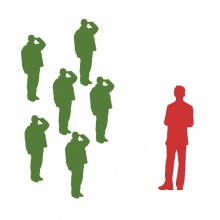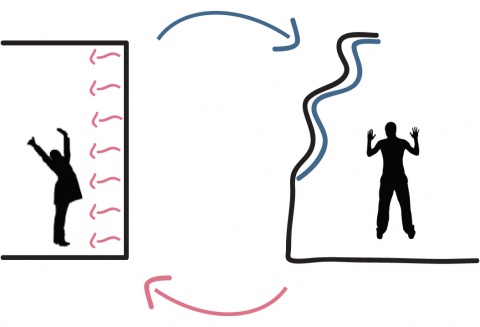project04:Frontpage
"The most important question is WHY? all the answers belong to WHAT? and every real interest pertains to HOW?"(Frederick Castle)
Contents |
Idea 1 'Who's in Charge?'
- interactivity among users, and between users and environment - each outcome different - it becomes a happening for the other visitors of the exhibition - we can set clear rules - it is a game - users create their own environment - it is a reflection on society - how society works - a question of control; related to greed - people as swarm
Why?
Who’s in Charge speaks about the understanding between individuals, collaborations and the division of power in general society. What influence do you have on your environment and the environment of others and others on you? What can you achieve single-handedly and what can be achieved by collaborative actions? The basic elements needed to be managed for survival used to be limited, but as globalization and technological development progress the scale of connections increase, resulting in an ascending complexity and number of issues to distribute control over. When is it still accounted for to say “Divide et Impera” or when will the notion of interrelated addition of quality, that the whole is more than the parts put together, take a more dominant place? The relations between individuality and swarm behavior will constantly have to find their contemporary balance. Therefore this play is a representation of the development of society. It visualizes the polemics, discourses and agreements necessary to build a common world, in which all the rules change again by the change of numbers in the flock.
-Reference/Analogies-
How?
It’s a game of power. A clear set of rules is programmed to define specific changes in the environment (lights, sounds, kinetic structures) as a result of player actions. The rules change accordingly to the number of players involved in the game, i.e. the division of control over the environmental expression becomes progressively complex with the increase of the amount of participants. The players need to figure out what results their actions have and what influence the other players have thereon. However, this needs to be done for every time the group changes, as that means a change of rules. For the participants themselves it’s a constant power struggle, depending on greed, altruism and the understanding of causality. For the audience it’s a performance evocating the place of an individual in mass culture.
-Diagrams-
-References/Analogies-
What?
Text text text
-Diagrams-
-References/Analogies- Everybody Makes Proposals Before Tomorrow
Idea 2 'The non-verbal Message'
- messages - sending messages through the environment - the recipient can enhance/alter/destroy or give a different answer to the message. The environment thus changes - communication between users - communication between users and environment - how to make it architecture? - non-verbal communication as extension of the person
Why?
Text By Jacqueline
"Computers are an entirely different story. Even if we are not aware of it, we are constantly communicating with these machines, whether we are surfing the net, downloading an image or writing a text. We are giving instructions to the computer hoping that the machine correctly understands what we want which is not always the case. Failed communication and obstinate interpretations are day-to-day occurrences. But how did we so willingly adapt to talking to machines, either silently via the keyboard, or even verbally? How far does this communication actually extend beyond humans and machines, senses and signals, desires and codes? What new possibilities can be extracted from this particular type of communication?" Gabriele Gramelsberger - Story Telling Code
-Diagrams-By Oana
-References/Analogies-
How?
Text text text
-Diagrams-
-References/Analogies-
What?
Text text text
-Diagrams-
-References/Analogies-Everybody Makes Proposals Before Tomorrow



